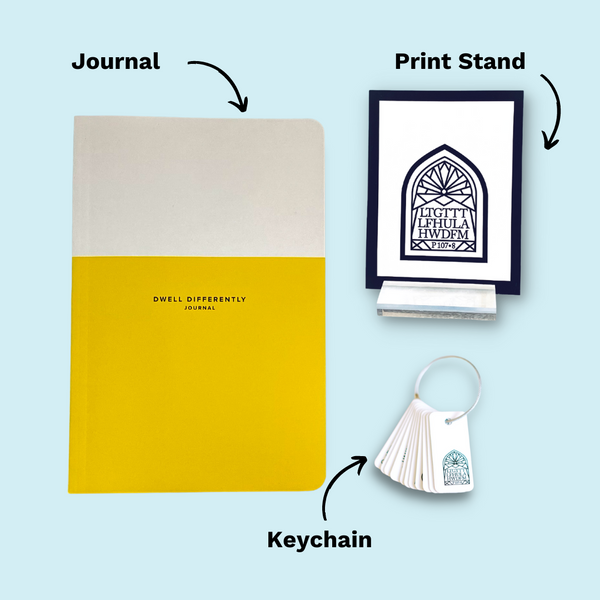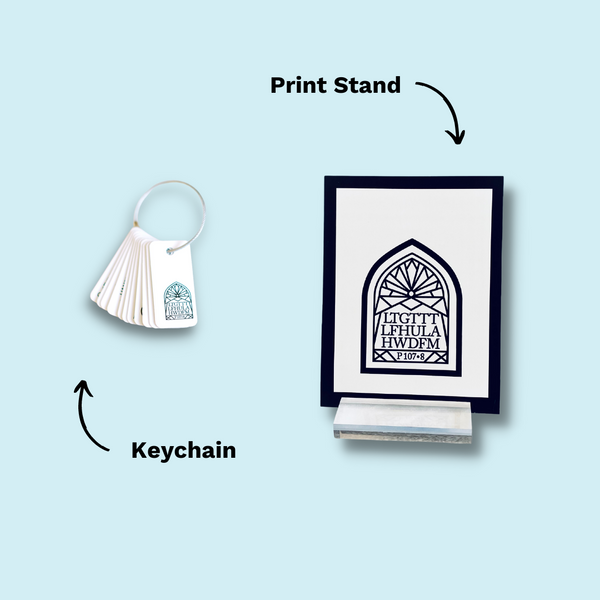THEREFORE, AS GOD'S CHOSEN PEOPLE, HOLY AND DEARLY LOVED, CLOTHE YOURSELVES WITH COMPASSION, KINDNESS, HUMILITY, GENTLENESS AND PATIENCE." — COLOSSIANS 3:12
I’ve been going to my mother-in-law’s house since 2006, and she loves decorating with signs, like you’d buy at Hobby Lobby. I think they’re meant to be uplifting, but they tend to take a commanding mood that I find vaguely threatening. In the guest bathroom one reads something like, “Live each day to the full, and make it so joyful that you always remember it.” And I think, "Sheesh, I just want to use the toilet, why the pressure to make this day that memorable?"
Commands or instructions in general can be tricky to relate to, especially when they’re ones we agree with in principle. Who among us wouldn’t nod along when being told to make time for rest, or to make healthful food choices? And yet being told to do something, even something we align with, doesn’t lead in a straight line to that something being done.
Our verse this month is just such an unobjectionable command:
“Therefore, as God’s chosen people, holy and dearly loved, clothe yourselves with compassion, kindness, humility, gentleness and patience.” — Colossians 3:12
I mean, who doesn’t love kindness, for example?
Some of us have been in Christian circles a long time; others of us less. Either way, the presence of commands, even very good commands, can oh so easily feel crushing to us. But I want to suggest that if we look just a few verses ahead at Colossians 3:15-16, we get a clue into how the imperatives in verse 12 aren’t meant to crush us.
The Peace and Word of Christ
Look with me, and find the main clauses:
“And let the peace of Christ rule in your hearts,” in Colossians 3:15, and “Let the word of Christ dwell in your richly,” in Colossians 3:16 (ESV).
“Let the peace” and “let the word.” Let, let. To let something happen means typically that someone or something else began the action, and your role is not stopping it. These “lets” bring us back into the heart of the gospel, because they remind us that the action began outside of us. God is the one who initiated our rescue, our adoption, and two aspects of that gospel are represented here.
First, God in Christ won for us peace. In Ephesians 2, Paul writes that Christ himself is our peace; that on the cross, through the violent breaking of his body, he tore down the barrier between us and God, and between Jew and Gentile. So don’t imagine this peace as a tame background hum, a peace of mere absence. In our passage, we’re told we need to let this peace rule; it’s not first about a way you feel, but first about how we relate to each other.
The peace of Christ is available; he died for us to have it. Yet Paul tells us, we have to let it rule. We can and have fought against this ruling peace, choosing other things instead. Maybe comfort, or grudges, or fear. But this imperative “let” is a plea to lay down our arms, to allow the Kingly peace of Christ to rule among us.
But how? How do we let the peace of Christ rule among us? That’s where the second “let” comes in, from Colossians 3:16: “Let the word of Christ dwell in you richly…”
A dweller is someone who has full access to a space, and full authority over it. It is the authority and access of presence, not like an absentee landlord. It is the authority and access of permanence, not like a visitor. And what would it mean to dwell richly? This conjures someone who is living life fully engaged in and with their household. Not withdrawn, not sullen, but knowing and fully known. In order for the Word of Christ to dwell richly among us, it must have this same kind of access to and authority over us.
Maybe we have the Word around us, but we don’t allow it to impact us, not really. If so, we have to repent. God has given us his Word and his people so that we might be transformed. That’s why Paul writes about teaching and admonishing each other in Colossians 3:16. But notice what else happens: singing. Christianity is a singing faith. This is not a cruel, squinty-eyed dwelling of the Word, like the secret police of communist East Berlin. This is a Word of Christ that produces wisdom and song, if we let it! Only God can produce this truly, and he wants to.
These two verses are the keys to the rest. If we allow Christ’s peace to rule and Christ’s Word to dwell, we’ll be able to put on the resurrection clothes of verse 12 he’s laid out for us. Let’s turn again to our imperatives.
Resurrection Clothes
We’re told to put on these things, based on our being seated with Christ (Colossians 3:1-3), like they’re clothes.
And what do we notice about these clothes? They are the kind of outfit that complements people ruled by Christ’s peace, exactly the kit needed to teach and admonish each other with singing. Every sport has its uniform, many jobs as well. If you are an Olympic swimmer, wearing a nurse’s scrubs will not help you, and vice versa. We’ve been called to allow peace to rule and the Word to dwell, and compassionate hearts, kindness, humility, meekness, patience, bearing with each other—aren’t these exactly the resurrection clothes we need to get the job done?
My daughter plays town soccer and she’s got a cute little uniform. She’s still learning the game, like all her teammates she makes mistakes. The uniform belongs to her not because she’s perfect, but because she’s a player. Her parents bought her a place on the team, and she has a right to the uniform regardless of her skill. Similarly, these clothes of Colossians 3:12 were bought for us by Christ, regardless of our skill, and we get to wear them entirely on his purchase. He earned it, and he’s put us in the game.
If as a community we are allowing the peace of Christ to rule, if we are allowing the Word of Christ to dwell richly, and putting on our resurrection clothes with singing and forgiving love, then we actually have a shot at seeing this verse come true among us. Not perfectly, but truly. We need each other, we need the risen Lord, and we need his Word—and all of these needs he has richly supplied.




